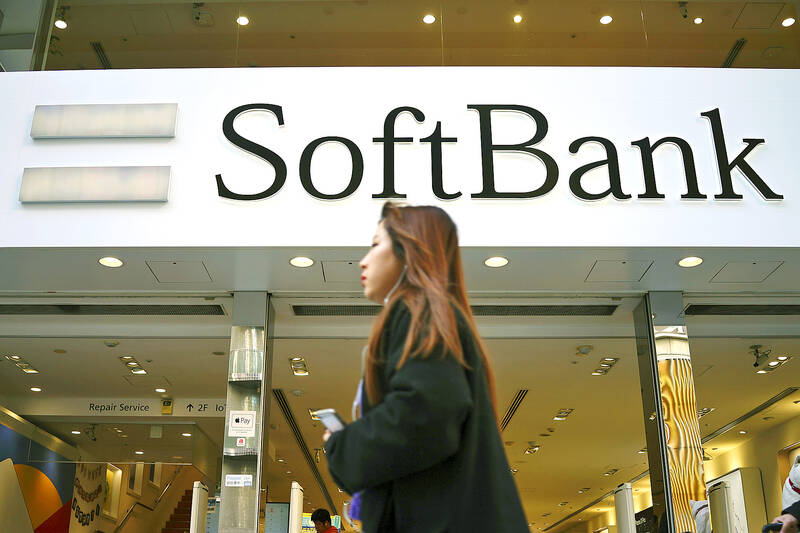Japan’s Softbank Group Corp yesterday reported a surprise US$5.9 billion net loss in the fiscal third quarter, as a slump in the tech sector continued to hit the investment behemoth’s bottom line.
The loss compared with the net profit of ¥29 billion (US$220 million) the firm reported in the same three-month period last year.
Its two Vision Fund investment vehicles alone lost ¥660 billion in the October-to-December quarter, “reflecting declines in the share prices of a wide range of portfolio companies,” Softbank said.

Photo: AP
The firm has made huge bets to find and grow hot new tech ventures around the world, but that has left its earnings vulnerable to fickle market forces, and its Vision Funds have reported losses for four straight quarters.
Interest rate hikes by the US Federal Reserve and other central banks to tackle inflation have weighed on global tech shares, putting pressure on Softbank.
“Weakness in global equity markets remains the main risk to the Softbank story,” said Kirk Boodry, an analyst at Redex Research who publishes on Smartkarma.
Softbank chief executive officer Masayoshi Son has regularly defended his strategy of making major bets on high-tech firms and start-ups, saying that the approach would lead to a handful of significant wins that outweigh losses.
However, his tactics have come under increasing scrutiny given the firm’s successive losses, and Son is not delivering the company’s results presentation. Softbank chief financial officer Yoshimitsu Goto was expected to do the talking instead yesterday.
Last quarter, Goto said that the company was “very pessimistic.”
Analysts said there was good reason to be cautious.
“The overall investment environment is very tough including on US shares,” Toyo Securities Co analyst Hideki Yasuda said before the results.
However, he and other observers say the firm might start to see the benefits of an improving situation in China.
“We are generally somewhat negative on Softbank’s positioning heading into 2023 with concerns on tech valuation at the forefront,” Broody wrote.
“But a recovery in China ... provides some support,” he said, adding that Beijing’s crackdown on tech firms and its COVID-19 policies “both appear to be leveling out.”

TECH BOOST: New TSMC wafer fabs in Arizona are to dramatically improve US advanced chip production, a report by market research firm TrendForce said With Taiwan Semiconductor Manufacturing Co (TSMC, 台積電) pouring large funds into Arizona, the US is expected to see an improvement in its status to become the second-largest maker of advanced semiconductors in 2027, Taipei-based market researcher TrendForce Corp (集邦科技) said in a report last week. TrendForce estimates the US would account for a 21 percent share in the global advanced integrated circuit (IC) production market by 2027, sharply up from the current 9 percent, as TSMC is investing US$65 billion to build three wafer fabs in Arizona, the report said. TrendForce defined the advanced chipmaking processes as the 7-nanometer process or more

China’s Huawei Technologies Co (華為) plans to start mass-producing its most advanced artificial intelligence (AI) chip in the first quarter of next year, even as it struggles to make enough chips due to US restrictions, two people familiar with the matter said. The telecoms conglomerate has sent samples of the Ascend 910C — its newest chip, meant to rival those made by US chipmaker Nvidia Corp — to some technology firms and started taking orders, the sources told Reuters. The 910C is being made by top Chinese contract chipmaker Semiconductor Manufacturing International Corp (SMIC, 中芯) on its N+2 process, but a lack

Who would not want a social media audience that grows without new content? During the three years she paused production of her short do-it-yourself (DIY) farmer’s lifestyle videos, Chinese vlogger Li Ziqi (李子柒), 34, has seen her YouTube subscribers increase to 20.2 million from about 14 million. While YouTube is banned in China, her fan base there — although not the size of YouTube’s MrBeast, who has 330 million subscribers — is close to 100 million across the country’s social media platforms Douyin (抖音), Sina Weibo (新浪微博) and Xiaohongshu (小紅書). When Li finally released new videos last week — ending what has

OPEN SCIENCE: International collaboration on math and science will persevere even if the incoming Trump administration imposes strict controls, Nvidia’s CEO said Nvidia Corp CEO Jensen Huang (黃仁勳) said on Saturday that global cooperation in technology would continue even if the incoming US administration imposes stricter export controls on advanced computing products. US president-elect Donald Trump, in his first term in office, imposed restrictions on the sale of US technology to China citing national security — a policy continued under US President Joe Biden. The curbs forced Nvidia, the world’s leading maker of chips used for artificial intelligence (AI) applications, to change its product lineup in China. The US chipmaking giant last week reported record-high quarterly revenue on the back of strong AI chip